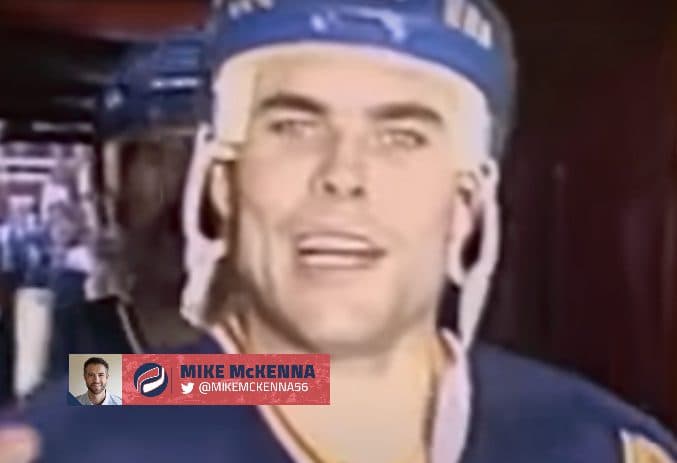McKenna: When a team breaks a fan’s heart at the trade deadline

On Mar. 5th, 1991, my hometown St. Louis Blues traded Geoff Courtnall, Sergio Momesso, Cliff Ronning, Robert Dirk, and a 1992 fifth-round draft pick to the Vancouver Canucks for Garth Butcher and Dan Quinn. I was apoplectic.
It didn’t make any sense to me then, and it still doesn’t today. Geoff Courtnall was a massive part of the Blues offense that season, Momesso played a pivotal role as a power forward, and Cliff Ronning was an exciting homegrown talent.
And the names! I was eight years old when the trade went down. There was no better hockey name than Sergio Momesso. Go ahead and sound it out. Now imagine being in third grade. Momesso’s name was next-level awesome. And Cliff – that’s just a cool name from the ’80’s. I might actually push to name our next family pet Cliff. It’s a great name.
Anyway, Butcher went on to be a favorite of mine. But on that day in March of 1991, the Blues made me cry.
It wasn’t the only time I was left wondering why my favorite team would do such a thing. A year later, at the 1992 trade deadline, the Blues dealt future Hall of Famer Adam Oates to the Boston Bruins.
I thought it was the dumbest move imaginable. Brett Hull scored 86 goals during the 1990-91 season, and the majority of helpers came from Oates. In 1991-92, the duo were on a similar pace. But Oates was in the midst of a contract squabble with Blues management.
Back then, contracts could be re-negotiated. And Oates wanted to be compensated at a level appropriate for a player that put up 115 points in 61 games the previous season. Hull knew the value of having Oates as his setup man: he even offered to defer salary so the Blues could reach a new agreement with the talented center.
The management in St. Louis refused to budge. Instead of giving in to Oates’ demands, the Blues traded him to the Boston Bruins for center Craig Janney and defenseman Stephane Quintal.
So there I was, at nine years old, trying to understand why my favorite team thought it was a good idea to split up the best scoring tandem in the NHL.
I had a poster of Hull and Oates on my wall as a kid. The Blues built an entire marketing campaign around their names, a play on the classic rock band Hall & Oates.
Looking back, the poster was pretty ridiculous. Hull is on the microphone. Oates is strumming a Fender Stratocaster. They’re both wearing Blues jerseys under leather jackets. And they’re on skates. It’s the pinnacle of 1990’s cheesiness.
But I loved that poster. I woke up every morning and saw it. And every fan in St. Louis knew that Brett Hull and Adam Oates were destined for greatness together. With the duo as linemates, the Blues were set to be contenders well into the future.
Until the Blues cheaped out and refused to pay Oates what he was worth. For the second straight trade deadline, I was devastated. I bled blue as a kid. I cared so much. I went to the games and cheered my head off for a team that chronically underperformed in the Stanley Cup Playoffs.
To this day, my friends still talk about how devastating the trades were to the St. Louis fanbase. How tone-deaf management was. And how naive they were to think Janney could somehow replace Oates as Hull’s setup man.
I don’t mean that with any disrespect to Janney. He was a good hockey player. But he wasn’t Adam Oates. Janney played just two full seasons with the Blues before being sent westward to the San Jose Sharks.
20 years later, I have a better understanding of why things happened. The economics of hockey can influence decisions in ways we can’t fully grasp from the outside looking in.
But the crazy part of this story is that in both cases, the fans were right. The trades were total garbage from the get go. And as time passed, they looked even worse.
The harsh reality is that NHL teams really don’t care about their fans when making decisions on personnel. It’s all business.
As a 38-year old who’s now been a part of the NHL machinery for almost 20 years, I understand that’s how it has to be. Emotion cannot be a factor for a general manager. And principles need to be upheld.
But it doesn’t take away the sting that fans – especially kids – feel when their favorite players are unceremoniously shipped out of town. Especially for a lackluster return.
I’m fine now. I promise. I’ve forgiven the Blues. But I didn’t forget. Sometimes the NHL trade deadline is as stressful for fans as it is for players.
